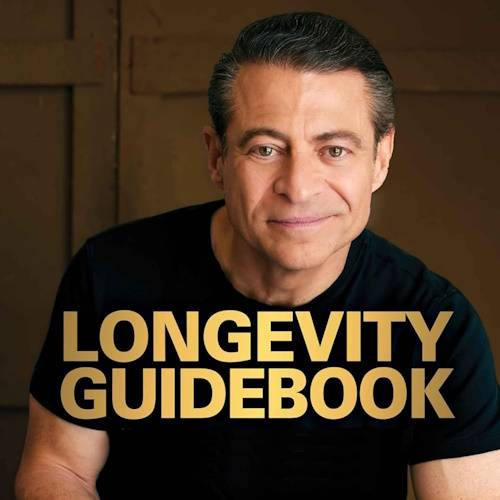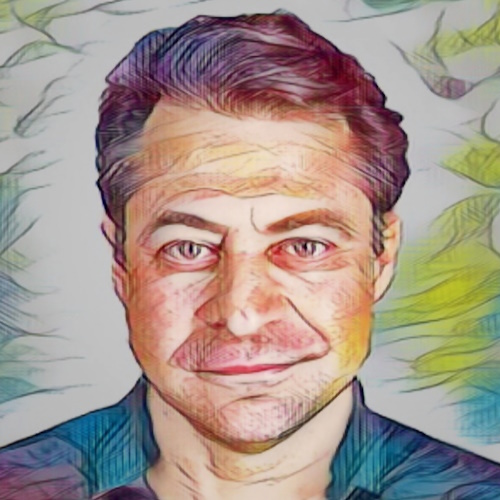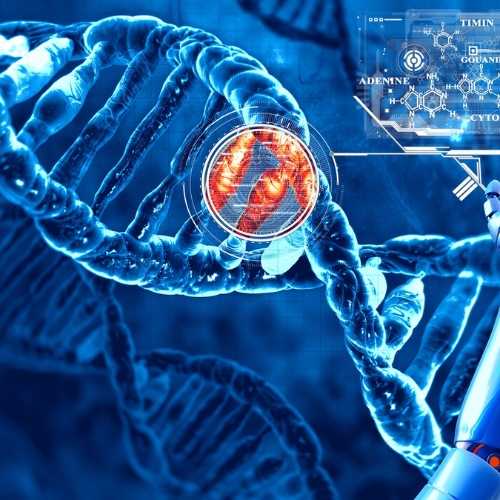Longevity Guidebook
A guide How to Slow, Stop, and Reverse Aging and NOT Die from Something Stupid, written by Peter Diamandis
We are in the midst of a healthspan revolution that will enable us to live vitally beyond 100 years old. Advanced diagnostics are now able to catch any disease at inception, while advanced therapies in clinical trials have the potential to reverse disease while also slowing, stopping, and potentially even reversing aging.
Peter Diamandis, MD, designed Longevity Guidebook as an easy to use roadmap to help you understand the power of this healthspan revolution (driven by AI, CRISPR, gene therapy, and cellular medicine) and to inspire you to maintain your best health to intercept the transformative breakthroughs coming this decade.
In this book, you will learn:
- That greater than 70 percent of your potential longevity is based on your lifestyle, not your genetics.
- How to implement proven lifestyle practices that will optimize your diet, sleep, exercise, and mindset, all enabling extended healthspan.
- About advances in diagnostic and therapeutic technologies that will enable you to find and reverse disease at the earliest time possible.
- How to "NOT die from something stupid," and about the breakthroughs that can save your life and the lives of those you love.
The book includes a chapter on women's health by Helen Messier.
Longevity Guidebook Book Review
I'm going to cheat a bit with my review of Longevity Guidebook, using a sentence written in it by Peter Diamandis: "The challenge was not to accumulate material but to curate it to be easily consumable while maintaining rigorous scientific research backing." And I think he did a good job of that. Having recently read How Not to Age, by Michael Greger, which was more like a textbook in places, it was good to come across a readable longevity book full of useful advice at a level achievable by most people.
The Longevity Guidebook includes some really practical tips - including psychological ones such as saying no to dessert before it's offered as that is easier than when the menu or cake is in front of you. That's a lesson I learnt about myself a long time ago, I don't buy biscuits or treats at the supermarket as they won't be treats, they'll be gone with the first hunger pang! Even though he's a rich guy, there are also plenty of cheap tips such as keeping a pack of dental flossers in the car.
Having said that, a big chunk of the book is the list of all the 75+ supplements and medications he is taking and why (which is reflected in the highlights below). Again, he's not saying that you should take them all, but explains why he is (including which hallmarks of ageing they affect) and what the target biomarker results are.
Not so much a review of the book, but looking at the number of supplements he's taking, it's a lot! Like Bryan Johnson, even if you're monitoring your bloods carefully it would be impossible to determine which supplement is causing which result when there are so many potential interactions. My other concern is that he is a David Sinclair devotee, which means he is still taking resveratrol, who's longevity benefits, in my understanding, was disproved long ago.
He presents many personal aspects of his approach, but he's not saying everyone should do it the same way, more as examples of how we are all different; and definitely not trying to sell a one-size-fits-all lifestyle or diet. Though he does plug quite a few products from companies he has invested in, particularly Fountain Life, but I'm happy to give him the benefit of the doubt that he invested in them because he believes in them.
The final, and longest, chapter is dedicated to women's health and is written by two physicians at his company, Fountain Life. As it has been written separately, there is a little bit of duplication with prior chapters and has enough content to treat as a standalone mini book if that is what is of interest to you.
Highlights
Here are 101 key points from Longevity Guidebook:
- No singular diet serves everyone the best.
- The addictive power of sugar lies in its ability to trigger the release of dopamine in the brain’s reward center.
- Never go food shopping while you’re hungry.
- Large fish like tuna, swordfish, mackerel, and shark can contain very high levels of mercury.
- I proactively eat a whole-plant diet to the maximum extent possible.
- Eating a wide variety of colored fruits, vegetables, and spices corresponds to the consumption of different phytochemicals, vitamins, minerals, and antioxidants.
- Consuming no-calorie sparkling water since the carbonation helps fill my stomach and helps me to feel satiated.
- My goal is to consume 1.0 grams of protein per pound of body weight (2.2g per kg).
- I’ve eliminated 100 percent of sodas from my diet, given the added sugar and phosphoric acid they contain.
- Alcohol truly has very little medicinal benefit and is a major driver of microbiome disruption and leaky gut.
- Coffee is one of the largest sources of antioxidants in the typical diet.
- There is some evidence that drinking a lot of caffeine in slow metabolizers can increase your risk for heart disease.
- Take a few deep breaths to slow down your heart rate and increase your oxygen intake at the start of any meal.
- The order in which you eat your meal could have a significant impact on your health.
- One of the most compelling benefits of multi-day fasting is its ability to enhance autophagy.
- Resistance training can significantly slow down and even reverse aspects of aging.
- A number of studies have demonstrated a direct correlation between longevity and muscle mass.
- Supplementing with creatine can double your strength and lean muscle gains when compared to training without it.
- Several studies have found a direct correlation between VO2 max and longevity.
- Zone 2 training has been shown to be the best way to improve the functioning and efficiency of your mitochondria.
- I think of “sitting as the new smoking” — something to be minimized.
- A recent study found that participants who walked over 4,000 steps a day had healthier brain tissue, better memory, and superior cognitive function.
- There is a direct relationship between how well you sleep and how long you live.
- Full darkness stimulates higher melatonin levels, helping you fall asleep faster.
- About one hour before going to sleep, I try to put on a pair of blue-light-blocking glasses.
- Regularly getting less than six or seven hours of sleep each night doubles your risk of cancer.
- Most of us have no idea what’s really going on in our bodies.
- Seventy percent of all cancers that are fatal turn out to be the result of cancers that are not routinely tested for by today’s medical system.
- Out of 100 seemingly healthy adults who underwent a Fountain Life screening, 2.0 percent had a cancer they didn’t know about. 2.5 percent had an aneurysm.
- Medications and supplements need to be personalized for every individual.
- There is increasing evidence that heart disease may be even more correlated to Hemoglobin A1c (HbA1c) levels than with any other blood biomarkers.
- Low cholesterol levels have been associated with a higher risk of depression, anxiety, and cognitive decline.
- Rapamycin is likely to be the most impactful longevity therapeutic available at this moment.
- My Rapamycin Dosing: 0.1 mg/ kg once weekly to be cycled for three months on and one month off.
- Some experts suggest that maintaining total testosterone in the young, healthy range of 700–900 nanograms per deciliter (ng/dL) is reasonable and healthy.
- If you smoke or vape, please quit. It is the number one pro-longevity action you can take.
- Modafinil medication provides me with added alertness, focus, and clarity.
- I am always researching, learning, and adjusting my supplement regimen every quarter after my quarterly testing and in consultation with my physician.
- Coenzyme Q10 (CoQ10) with pyrroloquinoline quinone (PQQ), antioxidants that protect cells from oxidative damage.
- Humans and guinea pigs are the only mammals unable to make vitamin C and must get it from outside sources.
- I prefer to use natural forms of vitamin E rather than synthetic forms, which are made from petroleum products and are less potent.
- Folate (Vitamin B9) is essential for DNA synthesis and repair.
- Magnesium is a cofactor in over 300 enzymatic reactions.
- Curcumin, the active compound in turmeric, has powerful anti-inflammatory and antioxidant properties.
- Quercetin has been shown to stabilize mast cells and can effectively prevent allergic symptoms.
- Since many soils are low in selenium, selenium deficiency is becoming more common.
- Derived from the astragalus root, TA-65 is believed to activate telomerase, the enzyme responsible for maintaining and extending telomeres.
- Omega-3 Fatty Acids have anti-inflammatory properties and may protect against telomere shortening.
- Vitamin D with K2 is thought to play a role in telomere maintenance.
- Zinc is an essential mineral that plays a role in DNA repair and synthesis, including telomere maintenance.
- Sulforaphane: This powerful compound is found in cruciferous vegetables like broccoli can modulate the activity of these histone deacetylases.
- Epigallocatechin gallate (EGCG) in green tea is known to modify DNA methyltransferases and histone deacetylases, enzymes involved in epigenetic modifications.
- S-Adenosyl Methionine (SAMe) is a key methyl donor in the body.
- Alpha-Ketoglutarate (AKG) is a metabolite that influences epigenetic regulation by serving as a cofactor for enzymes that modify histones and DNA.
- High-Quality Essential Amino Acids, particularly leucine, are important for muscle protein synthesis and repair.
- N-Acetylcysteine (NAC) is the rate-limiting precursor to glutathione.
- Supplements like ginseng and ashwagandha may induce the production of heat shock proteins (HSPs), thereby enhancing the cell’s ability to manage damaged or misfolded proteins.
- Alpha-lipoic acid is used to decrease insulin resistance in our cells and regulates AMPK in the hypothalamus, decreasing feelings of hunger.
- Pterostilbene activates sirtuins and other pathways involved in the stress response and proteostasis.
- Berberine is a plant alkaloid that activates AMP-activated protein kinase (AMPK), a key enzyme involved in energy balance and nutrient sensing.
- Metformin may inhibit the mTOR pathway, potentially reducing the effectiveness of resistance training and muscle growth.
- With age, mitophagy becomes less efficient, resulting in the accumulation of defective mitochondria.
- Urolithin A’s role in enhancing mitophagy helps keep mitochondria healthy and efficient.
- LCAR and ALCAR transport fatty acids into the mitochondria, where they are used for energy production.
- MitoQ acts as a powerful antioxidant within mitochondria.
- Fisetin has been shown to act as a senolytic.
- Spermidine supports the health and function of stem cells by enhancing autophagy.
- Rhodiola Roseamay help protect stem cells from stress-induced damage.
- Carnosine can protect cells from the harmful effects of advanced glycation end-products (AGEs) and oxidative stress, which can impair cellular communication.
- Melatonin has anti-inflammatory effects and can improve immune function.
- Astaxanthin can enhance autophagy and reduce oxidative stress, supporting cellular repair and maintenance.
- Boswellia Serrata (Frankincense) is an herbal extract with potent anti-inflammatory properties.
- Ginger reduces inflammation by inhibiting the production of pro-inflammatory cytokines and prostaglandins.
- Cal/Mag Butyrate supplements support gut health and overall well-being.
- Inulin is a type of prebiotic fiber found in various plants.
- L-Glutamine is an amino acid that plays a key role in gut health, supporting the integrity of the gut lining and helping reduce gut permeability (leaky gut).
- Zinc Carnosine supports gut health by maintaining the integrity of the gut lining and the immune system.
- Saccharomyces Boulardii is a beneficial yeast that acts like a probiotic.
- I consume 5 mg of creatine daily that supports muscle strength, power, and endurance by enhancing ATP production in muscles.
- Taurine is an amino acid with a wide range of pro-longevity benefits.
- Prodrome Neuro supports brain health primarily by promoting the synthesis of omega-3 plasmalogens.
- Prodrome Glia supports brain health by restoring omega-9 plasmalogen levels and preventing demyelination.
- Liposomal Phospholipid Complex supports brain health by enhancing the integrity and function of neuronal membranes.
- BAET or Beta-AET (androst-5-ene-3β, 7β, 17β-triol) is a metabolite of DHEA (dehydroepiandrosterone) and has notable anti-inflammatory and immune-stimulating properties.
- Arterosil is a supplement that has been shown to regenerate the endothelial glycocalyx.
- OneSkin’s experiments have shown that their peptide can significantly decrease the level of senescent cells, reducing the age of the skin by several years at a molecular level.
- You don’t want to eliminate all senescent cells as they also have a beneficial role to play in your body.
- Recent clinical human trials using TPE have already reported positive results for the treatment of various age-related diseases.
- As we age, our supply of stem cells begins to diminish, as much as 100 to 10,000-fold.
- Exosome-based therapies are being developed to promote tissue regeneration to enhance healing and repair processes.
- Lifestyle choices account for at least 70 percent of your longevity.
- Optimistic people live as much as 15 percent longer than pessimists.
- Drinking water (typically two cups) as soon as possible after waking up helps rehydrate the body and improve digestion.
- I’m clear that exercise is my number-one pro-longevity protocol.
- My goal is to limit my eating to five hours.
- The connection between oral health and systemic diseases is well-documented and profound.
- Xylitol is known to reduce the levels of harmful bacteria in the mouth.
- Women have higher rates of inflammation, autoimmune diseases, Alzheimer’s, and stroke.
- Menopause increases the risk of conditions like osteoporosis, cardiovascular disease, dementia, and some cancers.
- Many of these environmental toxins contain xenoestrogens — external agents that mimic the function of natural estrogen in the body.
- On average, women require about 20 more minutes of sleep per night than men.
Visit website: https://longevityguidebook.com/home-blk-nav
Peter Diamandis
Founder/co-founder of XPRIZE, Singularity University, Human Longevity Inc., and more
Details last updated 29-May-2025







